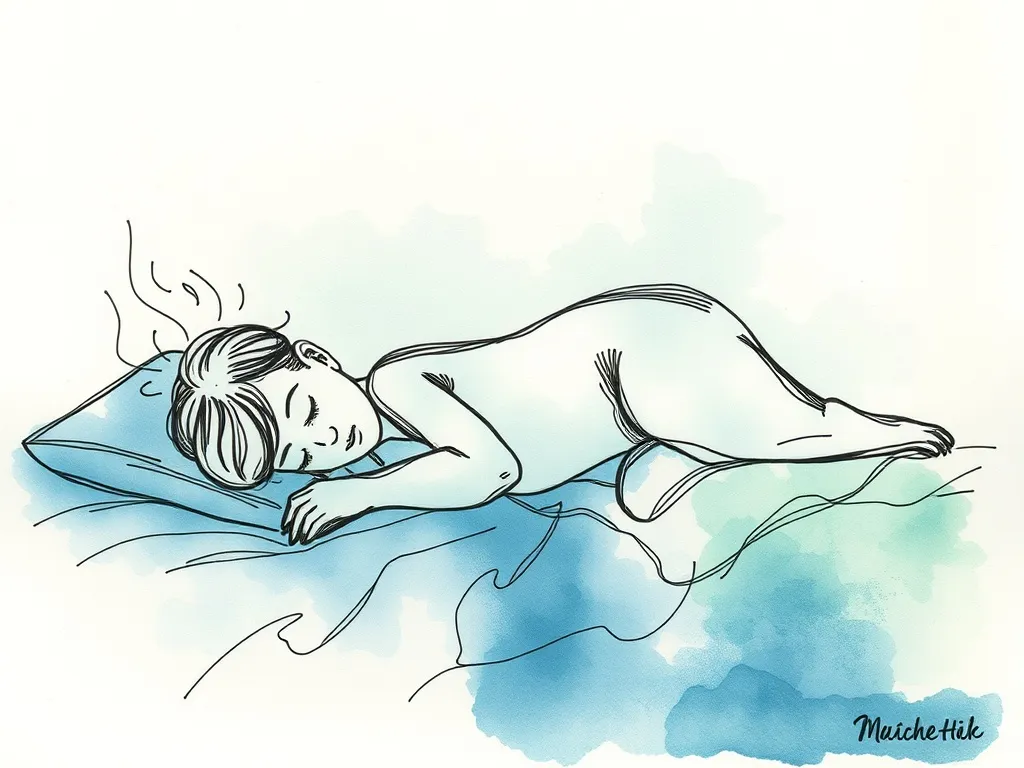· Don Schmidt · Guides · 9 min read
Is Online CBT-I Effective? A Comprehensive Review of Digital Sleep Therapy in Alberta
Explore the effectiveness of online CBT-I for insomnia in Alberta. Discover digital sleep therapy options and how they can improve your sleep.

Introduction: The Rise of Digital Sleep Therapy in Alberta
Sleep is fundamental to our physical and mental well-being, yet for many Albertans, a good night’s rest remains an elusive dream. Insomnia, characterized by difficulty falling or staying asleep, affects a significant portion of the population, impacting daily life, productivity, and overall health. While traditional in-person therapies have long been available, the digital age has ushered in a new frontier: online Cognitive Behavioral Therapy for Insomnia (CBT-I).
Online CBT-I offers a convenient, accessible, and often cost-effective alternative to traditional therapy. But with so many digital sleep therapy options available in Alberta, a crucial question arises: Is online CBT-I truly effective? This comprehensive review delves into the evidence, explores available programs, and provides insights for anyone in Alberta considering this innovative approach to better sleep.
What is CBT-I and Why Online?
Before exploring its online effectiveness, it’s essential to understand the foundation of CBT-I.
The Core Principles of CBT-I
CBT-I is a structured, evidence-based program that addresses the underlying thoughts and behaviors contributing to insomnia. Unlike sleeping pills, which offer a temporary solution, CBT-I equips individuals with long-term strategies for improving sleep quality. It typically involves several key components:
- Cognitive Restructuring: Identifying and challenging negative thoughts and worries about sleep.
- Behavioral Interventions: Implementing strategies such as sleep restriction (limiting time in bed to consolidate sleep), stimulus control (associating the bed only with sleep), and maintaining a consistent sleep schedule.
- Sleep Hygiene Education: Providing guidance on lifestyle factors that promote healthy sleep, such as diet, exercise, and creating a conducive sleep environment.
- Relaxation Techniques: Teaching methods like progressive muscle relaxation or mindfulness to reduce arousal before bed.
If you’re curious about the mechanics behind this powerful treatment, you can gain a deeper understanding of how this powerful sleep therapy works and its comprehensive approach to tackling sleep problems.
Advantages of Online CBT-I
Online CBT-I offers several compelling advantages, especially for individuals living in a vast province like Alberta:
- Accessibility: Overcomes geographical barriers, making therapy available to those in rural or remote areas who may not have access to in-person specialists.
- Convenience: Allows individuals to complete sessions from the comfort of their home, at times that fit their schedule, reducing the need for travel and time off work.
- Cost-Effectiveness: Often more affordable than traditional in-person therapy, with some programs being publicly funded or covered by private insurance.
- Anonymity and Comfort: Some individuals feel more comfortable discussing personal sleep issues in a digital environment.
- Self-Paced Learning: Many online programs allow users to progress at their own speed, revisiting modules as needed.
The Evidence: Is Online CBT-I Effective?
This is the million-dollar question for many considering digital sleep therapy. The good news is that a growing body of research overwhelmingly supports the effectiveness of online CBT-I.
Research and Clinical Trials
Numerous studies, including randomized controlled trials, have demonstrated that online CBT-I is a highly effective treatment for chronic insomnia, often producing outcomes comparable to face-to-face therapy. These studies consistently show improvements in:
- Sleep Onset Latency (SOL): The time it takes to fall asleep.
- Wake After Sleep Onset (WASO): The amount of time awake after initially falling asleep.
- Total Sleep Time (TST): The overall duration of sleep.
- Sleep Efficiency (SE): The percentage of time in bed actually spent asleep.
- Insomnia Severity Index (ISI) Scores: A subjective measure of insomnia severity.
Many studies also report a significant reduction in the reliance on sleep medications among participants. The consensus among sleep experts and healthcare professionals is that online CBT-I is a first-line treatment for chronic insomnia, recommended even before considering pharmacological interventions. When it comes to making the right choice for insomnia treatment, considering options like CBT-I vs. sleeping pills is crucial, as online CBT-I offers a non-pharmacological path to lasting improvement.
Patient Outcomes and Satisfaction
Beyond clinical metrics, patient satisfaction with online CBT-I is generally high. Users appreciate the flexibility and privacy of the digital format. Many report a renewed sense of control over their sleep, feeling empowered by the strategies they learn. The self-management approach of CBT-I, whether online or in-person, fosters sustainable sleep habits rather than dependency on external aids.
Navigating Online CBT-I Options in Alberta
Albertans have several avenues to access online CBT-I, ranging from publicly funded initiatives to private digital platforms.
Publicly Funded Programs
Alberta Health Services (AHS) recognizes the value of CBT-I and has integrated digital options into its mental health services. Programs like “Sleepio” (often referred to in the context of Alberta) or similar provincially supported digital platforms provide structured CBT-I courses that may be accessible through referral from a family doctor or mental health professional. These programs are typically evidence-based and designed to deliver the core components of CBT-I in an engaging, interactive format.
It’s worth checking the AHS website or consulting your primary care provider for the most up-to-date information on publicly available digital sleep therapy programs in your health zone.
Private Online Providers
Beyond AHS, numerous private companies offer online CBT-I programs and virtual therapy services. These include:
- Subscription-based apps: Many highly-rated apps offer self-guided CBT-I modules, often with optional human coaching or therapist support for an additional fee.
- Telehealth platforms: Platforms connecting individuals with registered psychologists or therapists who specialize in CBT-I, delivering sessions via video conferencing.
- Specialized online clinics: Websites dedicated solely to providing digital CBT-I, often with structured programs and dedicated support.

When exploring private options, always verify the credentials of the providers and look for programs that are based on established CBT-I principles.
Factors to Consider When Choosing a Program
- Evidence-based Content: Ensure the program is rooted in scientific evidence and follows established CBT-I protocols.
- User Experience: Look for an intuitive, easy-to-navigate interface.
- Support Level: Decide if you prefer a fully self-guided program or one with access to a sleep coach or therapist.
- Cost and Coverage: Inquire about fees, potential provincial subsidies, or coverage through your private health insurance.
- Personalization: Some programs offer more tailored approaches based on individual sleep patterns.
- Reviews and Testimonials: Check what other users are saying about the program’s effectiveness and ease of use.
Who Can Benefit from Online CBT-I?
Online CBT-I is suitable for a wide range of individuals experiencing chronic insomnia. This includes:
- Adults with primary insomnia: Those whose sleep difficulties are not caused by another medical or psychiatric condition.
- Individuals with co-occurring conditions: While CBT-I doesn’t directly treat other conditions, it can significantly improve sleep for those also dealing with anxiety, depression, or chronic pain. In fact, CBT-I can be particularly effective for managing anxiety-induced insomnia.
- People with busy schedules or geographical limitations: Its flexibility makes it ideal for those who cannot attend in-person appointments.
- Those seeking a medication-free solution: For individuals who wish to avoid or reduce reliance on sleep aids.
While largely beneficial, it’s important to note that online CBT-I might not be suitable for everyone. Individuals with severe psychiatric disorders, active substance abuse, or certain complex sleep disorders (like sleep apnea or restless legs syndrome) should consult with a healthcare professional to determine the most appropriate course of action. Additionally, specific populations, such as CBT-I strategies for shift workers or tailored CBT-I sleep therapy for seniors, may benefit from programs designed to address their unique challenges.
Tips for Maximizing Your Online CBT-I Experience
To get the most out of your online CBT-I program:
- Commitment is Key: Treat it like any other therapy. Consistency and dedication to applying the techniques are crucial.
- Be Patient: Improvements may not happen overnight. It takes time for new sleep habits to form.
- Track Your Progress: Keep a sleep diary (many online programs include this feature) to monitor improvements and identify patterns.
- Create a Conducive Environment: Even if therapy is online, your physical sleep environment still matters.
- Don’t Be Afraid to Ask for Help: If your program offers support, utilize it. If not, consider consulting with a healthcare provider if you hit a plateau.
Addressing Concerns and Limitations
Despite its effectiveness, online CBT-I does have some limitations:
- Lack of Direct Interaction: For some, the absence of in-person interaction with a therapist can be a barrier to engagement or motivation.
- Self-Discipline Required: Success heavily relies on the individual’s ability to adhere to the program’s instructions independently.
- Not for All Sleep Disorders: It is specifically for insomnia and not a substitute for diagnosing or treating other sleep disorders.
- Technical Issues: Reliance on technology means potential disruptions due to internet connectivity or device issues.
The Future of Digital Sleep Therapy in Alberta

The landscape of digital health is rapidly evolving, and online CBT-I is at the forefront of this transformation. As technology advances and more research emerges, we can expect to see even more sophisticated, personalized, and integrated digital sleep therapy options becoming available in Alberta. This includes AI-powered coaching, wearable device integration for real-time feedback, and enhanced virtual reality experiences to aid relaxation. The future points towards a more accessible and tailored approach to sleep health for all Albertans.
Conclusion
Is online CBT-I effective? The overwhelming answer, supported by extensive research and positive patient outcomes, is a resounding yes. For Albertans struggling with chronic insomnia, digital sleep therapy offers a scientifically proven, convenient, and often accessible pathway to reclaiming restful nights and improving overall quality of life. By understanding the principles of CBT-I, exploring available options, and committing to the process, many can find lasting relief from insomnia’s grip and embrace the benefits of restorative sleep.
Frequently Asked Questions (FAQ)
Q1: Is online CBT-I as effective as in-person CBT-I?
A: Research consistently shows that online CBT-I is as effective as in-person CBT-I for treating chronic insomnia. Both formats deliver significant improvements in sleep onset, duration, and overall quality. The key is adherence to the program’s principles.
Q2: How long does online CBT-I typically take to show results?
A: While individual results vary, many people begin to see noticeable improvements within 2-4 weeks of consistently applying the CBT-I techniques. A full program typically lasts 6-8 weeks, with lasting benefits developing over time as new sleep habits become ingrained.
Q3: Are online CBT-I programs covered by Alberta Health Services or private insurance?
A: Some online CBT-I programs may be publicly funded or subsidized through Alberta Health Services, usually requiring a referral. Many private health insurance plans also offer coverage for psychological services, which can include online CBT-I provided by a registered psychologist. It’s best to check with your specific insurance provider or a program administrator for details.
Q4: Can I combine online CBT-I with other sleep medications?
A: It is generally recommended to discuss medication use with your doctor when starting CBT-I. While CBT-I aims to reduce reliance on medication, some individuals may initially use both. CBT-I can help you gradually taper off medications under medical supervision, as you develop healthier sleep habits.
Q5: What if I don’t see results from online CBT-I?
A: If you’re not seeing the desired results, consider revisiting the program modules, ensuring you’re consistently applying the techniques. It’s also advisable to consult with a healthcare professional or sleep specialist. There might be underlying issues that require a different approach, or you may benefit from one-on-one virtual or in-person therapy.
Assess Your Sleep Quality Today
Take our My Sleep Health Score assessment to get personalized insights about your sleep patterns and discover how CBT-I can help you achieve better sleep.

Don Schmidt
15+ years of experience in sleep therapy and Cognitive Behavioral Therapy for Insomnia (CBT-I). Passionate about connecting individuals struggling with sleep disorders to evidence-based, non-medical treatment solutions. Author of hundreds of articles and comprehensive guides on sleep health, CBT-I techniques, and overcoming insomnia. When not helping clients achieve better sleep, you can find me hiking with my family and dogs or enjoying a good book.
Ready to connect with a provider?
Allow us to connect you with a provider who can help.



